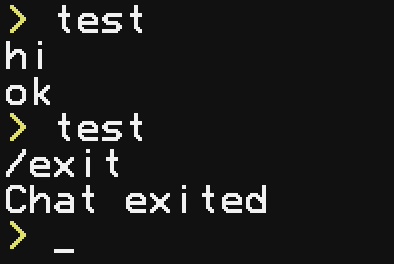Posted 05 January 2019 - 05:53 AM
Yes I'm pretty amateur at LUA and ComputerCraft but this is exactly what you expected the first line of this post to say, isn't it?
Jokes aside, the intention of this program is to be a simple chat. I've made the program so that you should be able to exit out of it without having to do Ctrl-T. I'm using 'error()' to quit the program instead. I've placed 'error()' in the function that detects whether or not the person entered "/exit" into the program, "/exit" being the command I chose for exiting the program.
So basically, typing "/exit" triggers 'error()'
In the following case, earlier in my chat program, using 'error()' to terminate the program works just fine. There are other instances of me using 'error()' in the program in order to terminate the program that are fundamentally the same (at least I believe they are) and they also work just fine.
The problem I have is typing "/exit" into the program does not cause the program to exit. (not the program above but the one at the end of the post)
When type "/exit" it continues the program as normal. At first I suspected the 'while true do' loop at line 47 was to blame. I isolated 'parallel.waitForAny' from the loop, removed the loop, then added 'print("ok")' at the end of the program to see if 'print("ok")' would be parsed even if I typed "/exit". If it did print on the screen "ok" even if I typed "/exit", that meant that the loop wasn't the reason my program didn't end. Alas, it printed "ok" on the screen even when I typed /exit.
The 'if' statement at line 16 is the logic that checks to see if the user inputted "/exit", and calls 'error()' if the user did. Along with calling 'error()' it also prints ("Chat exited.") and transmits boolean "false" through the modem channel. Those two functions work fine, despite 'error()' not working as expected, so I know this 'if' statement is not at fault. I tried adding print() after the 'error' in the same 'if' statement and that did not get parsed, which I think is important to note, but I'm not entirely sure if it's relevant because I think this reflects how error() works. Still, I know the 'if' statement is being parsed.
So now I believe 'parallel.waitForAny' at the end is the reason I can't use error() to terminate the program. Am I using error() wrong? How should I be terminating the program?
The following is the code from the same program as the code from above, but I shortened and modified it so that you only see the relevant bit. I commented out the loop at line 47 for the reason I stated above, being that I was testing to see if that loop caused the issue that I am having. I also numbered the lines which I know is not common practice but it parses fine and it helps me to explain what I'm talking about above.
Jokes aside, the intention of this program is to be a simple chat. I've made the program so that you should be able to exit out of it without having to do Ctrl-T. I'm using 'error()' to quit the program instead. I've placed 'error()' in the function that detects whether or not the person entered "/exit" into the program, "/exit" being the command I chose for exiting the program.
So basically, typing "/exit" triggers 'error()'
In the following case, earlier in my chat program, using 'error()' to terminate the program works just fine. There are other instances of me using 'error()' in the program in order to terminate the program that are fundamentally the same (at least I believe they are) and they also work just fine.
function printUsage()
print("Usage:")
print("chat <modem side> <channel>")
print("chat about")
end
if #args < 1 then
printUsage()
error()
end
The problem I have is typing "/exit" into the program does not cause the program to exit. (not the program above but the one at the end of the post)
When type "/exit" it continues the program as normal. At first I suspected the 'while true do' loop at line 47 was to blame. I isolated 'parallel.waitForAny' from the loop, removed the loop, then added 'print("ok")' at the end of the program to see if 'print("ok")' would be parsed even if I typed "/exit". If it did print on the screen "ok" even if I typed "/exit", that meant that the loop wasn't the reason my program didn't end. Alas, it printed "ok" on the screen even when I typed /exit.
The 'if' statement at line 16 is the logic that checks to see if the user inputted "/exit", and calls 'error()' if the user did. Along with calling 'error()' it also prints ("Chat exited.") and transmits boolean "false" through the modem channel. Those two functions work fine, despite 'error()' not working as expected, so I know this 'if' statement is not at fault. I tried adding print() after the 'error' in the same 'if' statement and that did not get parsed, which I think is important to note, but I'm not entirely sure if it's relevant because I think this reflects how error() works. Still, I know the 'if' statement is being parsed.
So now I believe 'parallel.waitForAny' at the end is the reason I can't use error() to terminate the program. Am I using error() wrong? How should I be terminating the program?
The following is the code from the same program as the code from above, but I shortened and modified it so that you only see the relevant bit. I commented out the loop at line 47 for the reason I stated above, being that I was testing to see if that loop caused the issue that I am having. I also numbered the lines which I know is not common practice but it parses fine and it helps me to explain what I'm talking about above.
1 modem.transmit(uChan,os.getComputerID(),true)
2
3 function help()
4 print("Commands:")
5 print("/help")
6 print("/exit")
7 end
8
9
10 function send()
11 -- if user inputted a command it will not transmit it by way of setting goodToSend to false
12 goodToSend = true
13 uInput = read()
14
15 --commands
16 if uInput == "/exit" then
17 print("Chat exited")
18 modem.transmit(uChan,os.getComputerID(),false)
19 error() -- This is the error() I expected to terminate the program, but it doesn't.
20 print("111") -- This isn't being parsed, most likely because of the error() before it. Important to note
21 end
22
23 if uInput == "/help" then
24 help()
25 goodToSend = false
26 end
27
28 --sends message
29 if goodToSend == true then
30 modem.transmit(uChan,os.getComputerID(),uInput)
31 end
32 end
33
34 function receive()
35 event,side,freq,reID,reMessage,distance=os.pullEvent("modem_message")
36
37 -- if reMessage is true or false it means that person joined or left, respectively
38 if reMessage==true then
39 print(reID.." joined the chat.")
40 elseif reMessage==false then
41 print(reID.." left the chat.")
42 else
43 print(reID..": "..reMessage)
44 end
45 end
46
47 --while true do
48 parallel.waitForAny(send,receive)
49 --end
50
51
52 print("ok")



